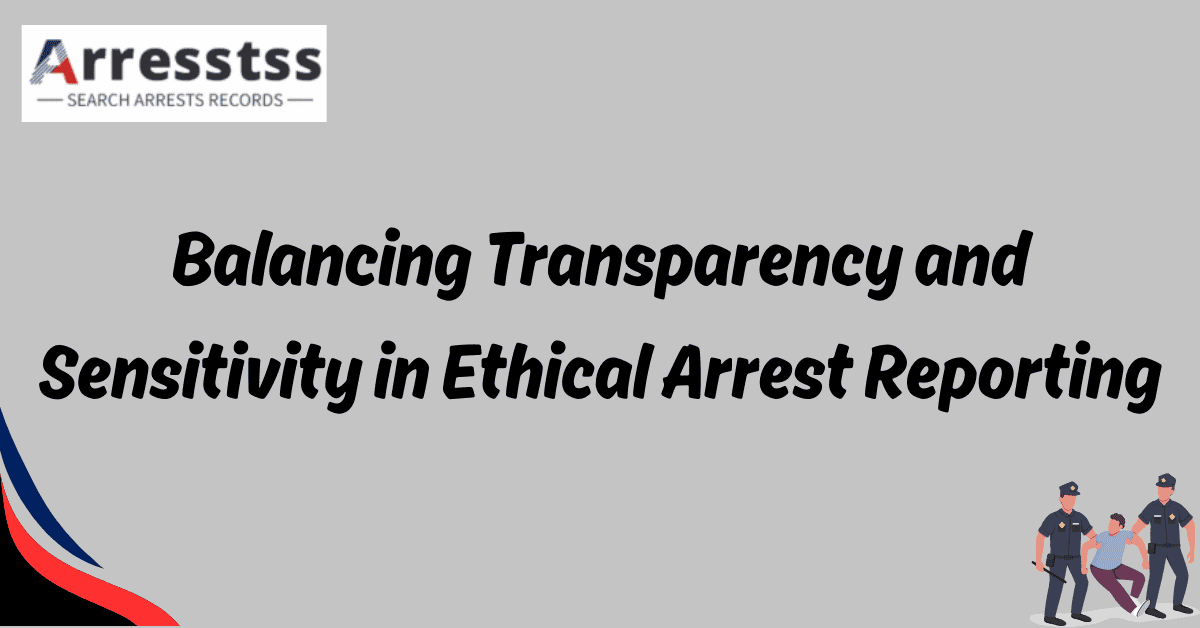Balancing Transparency and Sensitivity in Ethical Arrest Reporting
Ethical Reporting on Arrest Records: Transparency and Sensitivity
In today’s fast-paced world, staying informed about current events and developments is crucial. News outlets play a significant role in providing society with information, including arrest records. However, the publication of such records raises ethical questions regarding transparency and sensitivity.
Importance of Transparency
Transparency is an essential principle in journalism. It ensures that the public has access to accurate and reliable information. When it comes to arrest records, transparency allows citizens to stay informed about local crime rates and potential threats to their safety. It also encourages accountability within the justice system, as the public can assess how arrests are handled.
By making arrest records accessible, news outlets contribute to a more informed society. People have the right to know about incidents that may impact their community, and transparency ensures that citizens can make informed decisions about their safety and well-being. Furthermore, public access to arrest records fosters trust in the criminal justice system, as it allows individuals to see how law enforcement agencies handle arrests and investigate crimes.
Need for Sensitivity
While transparency is crucial, sensitivity is equally important when reporting on arrest records. It is essential to remember that these records involve individuals who may be innocent until proven guilty and are entitled to privacy and fair treatment. Reporting on arrests should aim to avoid unnecessary harm, stigmatization, or prejudice toward the individuals involved.
News outlets must be sensitive to how their reporting impacts the lives of those mentioned in arrest records. Sensationalizing or exaggerating details can lead to public shaming, harassment, or even wrongful assumptions about guilt. It is vital to consider the potential consequences of reporting, ensuring that the information shared is relevant and necessary for the public’s understanding of the situation.
Finding the Right Balance
Finding the right balance between transparency and sensitivity in reporting arrest records is a challenging task. Journalists must consider the potential harm their reporting may cause to individuals involved while also upholding the public’s right to information. This delicate balance requires careful thought and decision-making.
One approach to finding this balance is by adhering to ethical guidelines set by professional journalism organizations. These guidelines often emphasize the importance of verifying information, minimizing harm, and treating individuals with respect and fairness. By following these guidelines, news outlets can fulfill their duty to inform while respecting the dignity and privacy of individuals involved in arrest records.
Responsibility of News Outlets
News outlets have a significant responsibility when it comes to reporting on arrest records. They serve as a bridge between the public and the criminal justice system, providing valuable information that can impact people’s lives. As such, news outlets need to prioritize accuracy, fairness, and responsible reporting.
By adopting a responsible approach to reporting arrest records, news outlets can maintain their credibility and trust with their audience. This includes fact-checking information, verifying sources, and providing context to help readers understand the broader picture. News outlets must also be open to feedback and criticism from the public, as it allows them to improve their reporting practices and ensure they are meeting the needs of their audience.
Future of Ethical Reporting
Ethical reporting on arrest records is an ongoing conversation within the journalism industry. As society evolves, so do ethical standards and guidelines. News outlets must stay informed about these developments and adapt their practices accordingly.
It is crucial for news outlets to continuously assess and evaluate their reporting methods to ensure they strike the right balance between transparency and sensitivity. By doing so, they can contribute to a more informed and empathetic society, where the public is well-informed without sacrificing the rights and dignity of individuals involved in arrest records.
FAQ’s
Transparency is a fundamental principle in journalism, ensuring that the public has access to accurate and reliable information. When it comes to reporting arrest records, transparency plays a vital role in keeping citizens informed about local crime rates and potential threats to their safety. It also fosters accountability within the justice system, allowing the public to evaluate how arrests are handled. By transparently reporting arrest records, news outlets contribute to a more informed and engaged society.
Why is sensitivity important in reporting arrest records?
Sensitivity is an equally crucial aspect of reporting arrest records. These records involve individuals who may be innocent until proven guilty, and they are entitled to privacy and fair treatment. Sensitivity ensures that reporting on arrests avoids unnecessary harm, stigmatization, or prejudice towards the individuals involved. It recognizes the importance of preserving the dignity and privacy of those affected by arrest records, promoting a more compassionate and ethical approach to journalism.
Finding the right balance between transparency and sensitivity in reporting arrest records is a challenging task. Journalists can achieve this by adhering to ethical guidelines that prioritize minimizing harm while upholding the public’s right to information. They should carefully consider the potential consequences of their reporting and strive to avoid unnecessary sensationalism or invasion of privacy. By approaching the subject with empathy and professionalism, journalists can strike a balance between transparency and sensitivity.
Reporting arrest records insensitively can have severe consequences for the individuals involved. It can lead to stigmatization, prejudice, and damage to their reputation, regardless of their guilt or innocence. Insensitive reporting may also hinder their ability to receive a fair trial, as biased public opinions can influence the judicial process. Moreover, it can cause emotional distress and further harm to those affected by the arrests. Therefore, it is crucial to approach the reporting of arrest records with care and sensitivity.
News outlets can fulfill their duty to inform while respecting the dignity and privacy of individuals involved in arrest records by following ethical guidelines. They should prioritize verifying information from reliable sources before publication and avoid unnecessary sensationalism. Additionally, they can anonymize or withhold certain details to protect the privacy of those involved. By treating the subject matter with empathy, professionalism, and a commitment to minimizing harm, news outlets can strike a balance between fulfilling their duty to inform and respecting the rights of individuals.







